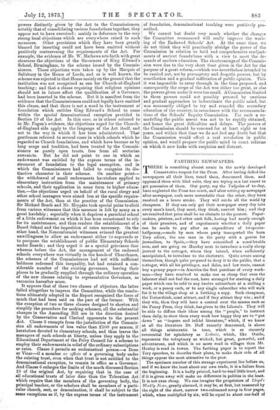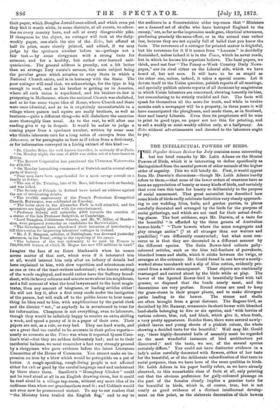FARTHING NEWSPAPERS.
THERE is something almost comic in the newly developed Conservative respect for the Press. After having defied the newspapers all their lives, taxed them, denounced them, and oppressed them with libel suits, they are trying as a last resort to get possession of them. Our party, say the Tadpoles of to-day, have neglected the Press too much, and after setting up newspaper after newspaper, each more unreadable than the other, they have resolved on a brave stroke. They will outdo all the world by cheapness. If they can only get their newspaper every day into every man's hand, they must, they think, convert him ; and they are resolved that price shall be no obstacle to the poorest. Paper- makers, printers, and other such folk, having had nearly enough of their promises, and of experiments whether a daily paper can be made to pay after an expenditure of twopence- halfpenny,—made by men whose party transported the born Tory editor, the one man in the party with a genius for journalism, to Spain,—they have subscribed a considerable sum, and are going on Monday next to introduce a really cheap journal to the cottager, whom they intend, when sufficiently manipulated, to introduce to the electorate. Quite aware among themselves, though quite prepared to deny it to the public, that a cottager, with all his privileges, and doles, and low rents, cannot buy a penny paper—in America the first purchase of every work- man—they have resolved to make one so cheap that even the labourer shall not feel the cost, have arranged for starting a daily paper which can be sold to any twelve subscribers at a shilling a week, or a penny each, or to any single subscriber who will walk for it to the village shop at a farthing a copy. Such cheapness, the Tories think, must attract, and if they attract they win ; and if they win, then they will have a control over the masses such as the Penny Press, they think, has given to the Liberals. They will be able to diffuse their ideas among the "people," to instruct them daily, to show them every week how happy they are to "put down" an "impure and infidel literature," which, if we knew at all the literature Dr. Duff recently denounced, is above all things aristocratic in tone, which is as sincerely reverential for upholstery as Lothair, which, like Ouida, represents the voluptuary as wicked, but great, powerful, and adventurous, and which is no more read in villages than Mr. Huxley is read in towns. The farthing paper is to report the Tory speeches, to describe their plans, to make their side of all things appear the most attractive to the poor. The specimen number of this strange experiment, lies before us, and if we know the least about our own trade, it is a failure from the beginning. It is a badly printed, hard-to-read little tract, and if it is given away will make no difference in politics in the least. It is not even cheap. We can imagine the proprietors of Lloyd's Weekly News, greatly alarmed, it may be, at first, but reassured by the sight of the short, narrow two-columned scrap in four pages, which, when multiplied by six, will be equal to about one-half of their paper, which Douglas Jerrold once edited, and which even yet they find it worth while, in Borne districts, at all events, to adver- tise on every country barn, and sell at every disagreeable pike. If cheapness be the object, no cottager will look at the daily- weekly paper, one-sixth the size of the Echo, but offered at half its price, more closely printed, and edited, if we may judge by the specimen number before us—perhaps not a fair test — by some clergyman with a strong taste for sermons, and for a healthy, but rather over-learned anti- quarianism. The general address is preachy, not a bit better than an average Tory curate's sermon, the main subject being the peculiar grace which attaches to every State in which a National Church exists, and is in harmony with the State. The poor cottager will read that, we acknowledge, for the type is big enough to read, and as his brother is getting on in America, where all such union- is repudiated, and his brother-in-law is prospering in Melbourne, where the national Church was abolished, and as he has some vague idea of Rome, where Church and State were once identical, and as he is exquisitely uncomfortable in a village where parson and squire are really brothers, as well as brethren—quite a different thing—he will disbelieve the assertion more thoroughly than usual. As to the rest, he will after one reading give it up in despair. It would be unfair to judge a coming paper from a specimen number, written by some man who thinks labourers care for a long series of excerpts from the Atheneum, or for paragraphs as bare as if taken from a dictionary, or for information conveyed in a Liebig extract of this kind :— " Dr. Charles Bake, the well known traveller, is seriously ill at Paris. "On Monday night, the sum of £450 was stolen out of a beer-house at Bolton.
"The Barrow Corporation has purchased the Mverston Waterworks for £19,500.
"On Monday haymaking commenced at Dulwich and in several other parts of Surrey. "Four men have been apprehended for a most savage assault on a family at Irvine.
"The son of Dr. Twining, late of St. Bees, fell from a rock on Sunday, and was killed.
"The Society of Friends in Ireland have issued an address against the use of intoxicating drinks. "The twelfth anniversary of the French Protestant Evangelical Church, Bayswater, was celebrated on Tuesday. "The horse show in the Alexandra Park is well attended, and the spectators are highly pleased with the entertainment. "Professor Selwyn will subscribe £500 towards the erection of a statue of the late Professor Sedgwick, at Cambridge.
"Lord Dunglass, Coldstream Guards, and Mr. W. Miller, of Mander- sten, were proposed yesterday as candidates for Berwickshire.
"The Government have abandoned their intention of introducing a bill this session for improving labourers' cottages in Ireland.
"Mr. J. F. Simpson, solicitor, of Nottingham, was drowned yesterday afternoon, in the Trent, owing to the capsizing of his canoe.
"The balance of the war indemnity to be paid by France is 750,000,000 francs, of which M. Magne has now 670 millions in hand."
Imagine the face of an Essex blacksmith when he comes across matter of that sort, which even if it interested him at all, would interest him only after an infinity of details had - been explained to him, with slow repetition and minuteness such as one or two of the tract-writers understand ; who knows nothing of the words employed, and would rather have the Sudbury broad- sheet, with its heavy columns and minute news about his neighbours, and a full account of what the local lawyers said to the local magis- trates, than any amount of telegrams, or leading articles either ! He will not buy it, after a first essay made under the instigation of the parson, but will walk off to the public-house to hear some- thing he likes read to him, with amplifications by the parish clerk and the district "vet.," or anybody he is accustomed to trust for his information. Cheapness is not everything, even to labourers, though they would be infinitely happy to receive an extra shilling a week, and spend a penny of it in a paper of their own. Their pipers are not, as a rule, so very bad. They use hard words, and are a great deal too careful to be accurate in their police reports— nearly as accurate as the Times was when it reported Queen Caro- line's trial—but they are seldom deliberately bad ; and as to their incidental badness, we must remember a fact very strongly pressed by a clergyman who gave evidence before the latest Literature Committee of the House of Commons. You cannot make an im- pression on iron by a blow which would be perceptible on a pat of butter. A rough-speaking, rough-living people is not affected either for evil, or good by the careful language used and understood by those above them. Smollett's "Humphrey Clinker" could not be read aloud at all in an English drawing-room, but it could be read aloud in a village tap-room, without any more idea of its unfitness than when our grandmothers read it ; and Cobbatt would not even now be pronounced violent. To say to our readers that "the Ministry have trailed the English flag," and to say to
the audience in a Somersetshire cider tap-room that "Ministers are a damned set of skulks who have betrayed England to the enemy," are, as far as the impression made goes, identical utterances, producing precisely the same effect, or in the second case rather less, because they are not equally full of belief that you know the facts. The reverence of a cottager for printed matter is frightful, but his reverence for it if it comes from " Lunnon " is decidedly diminished, unless indeed it is in the Times, which he never reads, but in which he knows his superiors believe. The local papers, we think, need not fear "The Penny-a-Week Country Daily News- paper," nor its rival either on the Liberal side, which we have heard of, but not seen. It will have to be as stupid as the other one, unless, indeed, it takes a special course. Let it devote itself to the Union question, publish reports of all meetings, and specially publish minute reports of all decisions by magistrates in which Union labourers are concerned, showing honestly its bias, but remembering to be strictly truthful and fair. The facts will speak for themselves all the more for truth, and while in twelve months such a newspaper will be a property, in three years it will have emancipated the ploughmen, and made them, as in Scotland, dour and hearty Liberals. Even then its proprietors will be wise to print in good type, on paper not too thin for printing, and to sell a weekly or semi-weekly edition only, at a halfpenny. An Echo without advertisements and devoted to the labourers ought to pay.



































 Previous page
Previous page